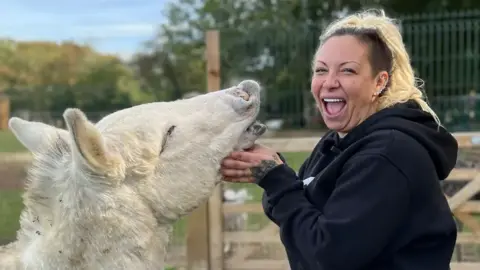In a recent court ruling, Jodie Marsh, a former glamour model and television personality, successfully fought against the Uttlesford District Council’s decision to deny her a wild animal license, which was essential for her to keep lemurs at her private animal sanctuary. The judge presiding over the case, District Judge Christopher Williams, determined that Marsh exhibited a genuine passion for the welfare of animals and should be permitted to continue her work at her sanctuary.
The court proceedings took place at Chelmsford Magistrates’ Court, where Marsh had brought the council’s refusal to the forefront after initially applying for the license in July 2024. The case was catalyzed by concerns that had arisen regarding Marsh’s trip to a local pub with a meerkat from her sanctuary, raising questions about the appropriateness of her care practices. In her defense, Marsh asserted that the council’s scrutiny was influenced by a campaign of online trolling directed against her.
Throughout the trial, Judge Williams acknowledged Marsh’s dedication, stating that there was “no evidence she has mismanaged any animals or caused any animals harm.” This statement directly countered the allegations raised by the council and its supporters, several of whom attended the court sessions to voice their disapproval of Marsh’s operations at Fripps Farm, located in Lindsell.
The judgment not only granted her the right to keep lemurs, but it also ordered the council to cover a sum of £19,641 in legal costs incurred by Marsh. This ruling highlights the contentious nature of the relationships between individuals running private animal sanctuaries and their local governing authorities, particularly when it comes to the perceived safety and welfare of the animals involved.
Marsh, known for her appearance in the 2002 ITV series “Essex Wives,” is committed to caring for a variety of animal species—currently including alpacas, emus, and reptiles—at her 4.5-acre sanctuary. The emotional weight of the ruling was evident when Marsh wept in court upon hearing the favorable outcome.
As described in various reports, Judge Williams mentioned that there was significant animosity present among parties involved in the case, reflective of broader tensions between animal care advocates and community concerns regarding wildlife management. Neighbors who opposed the continuation of Marsh’s sanctuary reiterated their unease, suggesting that local residents felt deeply about the implications of allowing a private individual to keep potentially exotic animals in their vicinity.
The saga surrounding Marsh’s animal sanctuary and the opposition faced from the local council and residents underscores a larger debate occurring within society about wildlife ownership, animal welfare rights, and community safety. Further media coverage hints at the ongoing challenges Marsh will continue to face, not only in terms of managing her sanctuary successfully but also in addressing the lingering public scrutiny that often accompanies high-profile figures in animal care.
Additionally, the court noted that the ring-tailed lemurs Marsh sought to adopt have since been rehomed elsewhere, adding poignancy to her victory as she will not be able to welcome them to her sanctuary even with the court’s favorable ruling. This highlights an instance where even a favorable legal outcome does not guarantee the desired impact on wildlife conservation, and it raises questions about accessibility for passionate animal advocates navigating such legal landscapes.
As Jodie Marsh moves forward with her sanctuary, maintaining transparency and fostering local community relations will be paramount to mitigating past tensions. The ruling emphasizes that while legal victories can be celebrated, the road to public acceptance and trust, especially in matters pertaining to animal care, remains a complex journey.



